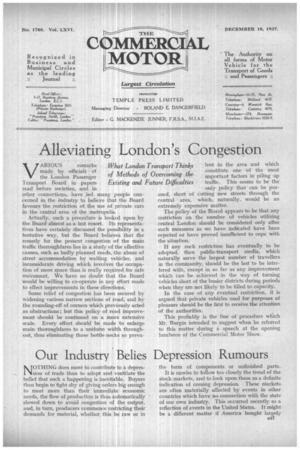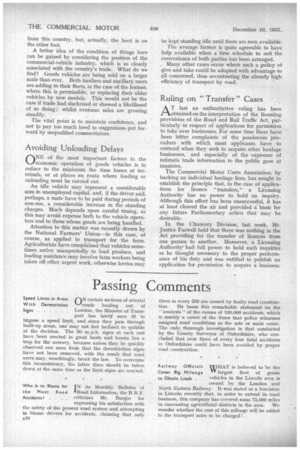Our Industry Belies Depression Rumours
Page 33

Page 34

If you've noticed an error in this article please click here to report it so we can fix it.
NOTHING does more to contribute to a depression of trade than to adopt and ventilate the belief that such a happening is inevitable. Buyers then begin to fight shy of giving orders big enough to meet more than their immediate economic needs, the flow of production is thus automatically slowed down to avoid congestion of the output, and, in turn, producers commence restricting their demands for material, whether this be raw or in the form of components or unfinished parts.
It is unwise to follow too closely the trend of the stock markets, and to look upon these as a definite indication of coming depression. These Markets are often materially affected by events in other countries which have no connection with the state of our own industry. This occurred recently as a reflection of events in the United States. It might be a different matter if America bought largely from this country, but, actually, the boot is on the other foot.
A better idea of the condition of things here can be gained by considering the position of the commercial-vehicle industry, which is so closely associated with the country's trade. What do we find? Goods vehicles are being sold on a larger scale than ever. Both hauliers and ancillary users are adding to their fleets, in the case of the former, where this is permissible, or replacing their older vehicles by new models. This would not be the case if trade had slackened or showed a likelihood of so doing ; whilst overseas sales are growing steadily.
The vital point is to maintain confidence, and not to pay to 6 much heed to suggestions put forward by unqualified commentators.
Avoiding Unloading Delays
(-NNE of the most important factors in the V./economic operation of goods vehicles is to reduce to the minimum the time losses at terminals, or at places en route where loading or unloading must be carried out.
An idle vehicle may represent a considerable sum in unemployed capital, and, if the driver and, perhaps, a mate have to be paid during periods of non-use, a considerable increase in the standing charges. Much depends upon careful timing, as this may avoid expense both to the vehicle operators and to those whose goods are being handled.
Attention to this matter was recently drawn by the National Farmers' Union—in this case, of course, as applied to transport for the farm. Agriculturists have complained that vehicles sometimes arrive unexpectedly to load produce, and loading assistance may involve farm workers being taken off other urgent work, otherwise lorries may be kept standing idle until there are men available. The average farmer is quite agreeable to have help available when a time schedule to suit the convenience of both parties has been arranged.
_ Many other cases occur where such a policy of give and take could be adopted with advantage to all concerned, thus accentuating the already high efficiency of transport by road.
Ruling on " Transfer " Cases
A T last an authoritative ruling has been obtained on the interpretation of the licensing provisions of the Road and Rail Traffic Act, particularly in respect of applications for permission to take over businesses. For some time there have been bitter complaints of the ponderous procedure with which most applicants have to contend when they seek to acquire other haulage businesses, and especially of the exposure of intimate trade information to the public gaze at inquiries.
The Commercial Motor Users Association, by backing an individual haulage firm, has sought to establish the principle that, in the case of applications for licence "transfers," a Licensing Authority has no power to hold an inquiry. Although this effort has been unsuccessful, it has at least cleared the air and provided a: basis for any future Parliamentary action that may be desirable.
In the Chancery Division, last week, Mr. Justice Farwell held that there was nothing in the Act providing for the transfer of licences from one person to another. Moreover, a Licensing Authority' had full power to hold such inquiries as he thought necessary to the proper performance of his duty and was entitled to publish an application for permission to acquire a business.


































